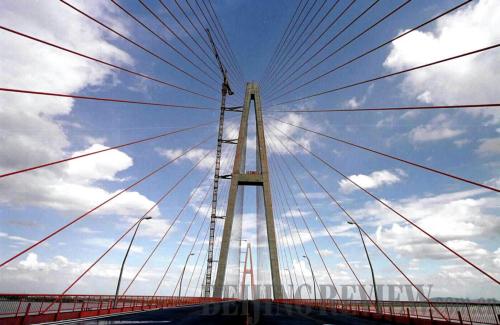|
 |
|
UNDER FIRE: Frequent extensive repairs of the Baishazhou Bridge over the Yangtze River in Wuhan, Hubei Province, stirs heated debate about enhancing the supervision and accountability system for public projects (XINHUA) |
Unattractive Megacities
The China Development Research Foundation recently released a report, saying China's urbanization process should focus on development of megacities and not small towns. The latter were criticized for being prone to wasting arable land.
China has been an agricultural society for thousands of years and people hope to enjoy urban life: skyscrapers, convenient transportation, and clean, well-designed communities.
But will megacities really make life better? Regardless of problems such as exploding population, skyrocketing housing prices, limited resources, environmental pollution and high crime rates, heavy traffic congestion alone has increasingly brought about deterioration of living conditions in big cities such as Beijing. As a result white-collar workers are leaving Beijing, Shanghai and Guangzhou, China's largest cities, and heading to smaller cities for a more comfortable life.
Rural residents are scattered across China's vast land. Small cities and towns are able to maintain their bonds with their home areas and at the same time offer them basic urban services. Compared to megacities, this seems to be the more acceptable path to urbanization in China.
Guangzhou Daily
Rising Vegetable Prices
Vegetable prices in many Chinese cities are rising.
In recent years, many local governments have reduced support of vegetable production. Instead, they are more interested in making huge profits from selling farmland to property developers. As a result, vegetable-growing land is shrinking sharply.
In order to sell at higher prices, potatoes produced in Inner Mongolia Autonomous Region are first delivered to China's largest vegetable distribution center in Shandong Province and finally sent to Beijing. The short distance between Beijing and Inner Mongolia is thus extended by more than 800 km. Vegetables that make these types of detours will surely carry a higher price.
Worse still, in Beijing's biggest vegetable wholesale market, none of the hundreds of vehicles of the 163 vegetable delivery centers has been licensed for business. In other words, residents in Beijing are consuming vegetables transported by illegally operated vehicles.
When vegetable prices rise due to factors including shrinking planting land and unreasonable delivery routes, many things must be done to relieve the consumers' burden.
Beijing Times
Costly Recurring Repairs
The 1.1-billion-yuan ($164-million) Baishazhou Bridge, the third bridge built over the Yangtze River in Wuhan, capital of central China's Hubei Province, is undergoing its 24th session of extensive repairs during its 10 years in service. The last extensive repairs, in the summer of 2009, allegedly used materials imported from the United States and cost more than 100 million yuan ($15 million). The local government said the work would sustain the bridge for at least six years.
There are sufficient funds, materials and technologies available. So why does the bridge keep failing? Relevant authorities attributed it to incompatibility of new materials and old technologies. Technological backwardness may be to blame. But it still cannot justify the fact no one is held accountable for the huge waste of money.
For China's large engineering projects, as a whole, the problem lies in the lack of supervision and accountability system. Without fundamental overhauls, fund-guzzling public projects such as the Baishazhou Bridge will continue to emerge. There should be no more delay with this work.
Beijing Times
Commercial Festivals
The Mid-Autumn Festival used to be the second most important traditional festival in China, behind the Spring Festival. But the meaning of this festival has been gradually distorted and is now viewed by many as the "festival of moon cakes," which are the special treat associated with it. Leading up to the day, people hurry to purchase luxuriously packaged moon cakes, not to eat, but to send to relatives and people important to advancement of their careers.
This strongly commercial atmosphere is diluting the rich festival tradition supposed to prevail around the Mid-Autumn Festival falling on the 15th day of the eighth month of the Chinese lunar calendar. There is nothing wrong with adding commercial factors to the traditional festival, but the problem is, when attempting to make money, businesses tend to focus on the most shallow and superficial aspects of the tradition. The deep cultural and historical significance of the festival is diluted by the commercialization of the treat. As a result, this centuries-old festival of family reunion has become a promotional day for food and commodities.
The cultural connotation is the essence of a traditional festival. The Mid-Autumn Festival is not the antithesis of a modern lifestyle, as any traditional festival should keep pace with the times. We should however focus on preventing such festivals from becoming hollow symbols of commercialism.
Yanzhao Evening News | 